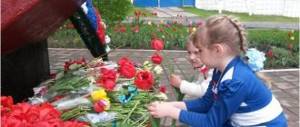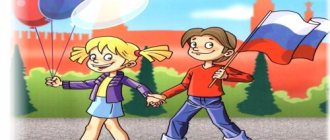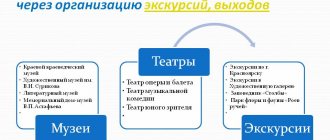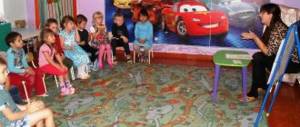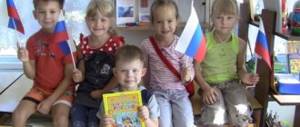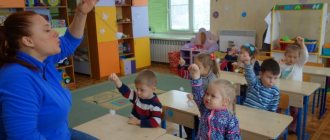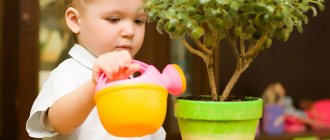MAGAZINE Preschooler.RF
PERSPECTIVE WORK PLAN FOR THE MORAL AND PATRIOIC EDUCATION OF CHILDREN IN OLDER - PREPARATORY GROUPMunicipal budgetary preschool educational institution kindergarten No. 28 “Firefly”
Prepared by teacher Budaragina L.M.
TASKS OF MORAL AND PATRIOTIC EDUCATION
- To cultivate in a child a feeling of love and affection for his family, home, kindergarten, street, city.
- Develop a caring attitude towards nature and all living things.
- Foster respect for work.
- Develop interest in Russian traditions and crafts.
- To develop basic knowledge about human rights.
- Expand your understanding of Russian cities.
- Introduce children to the symbols of the state (coat of arms, flag, anthem).
- Develop a sense of responsibility and pride for the country's achievements.
- To develop tolerance and a sense of respect for other peoples and their traditions.
The system and sequence of work on moral and patriotic education of children is presented as follows:
- Kindergarten;
- Family;
- Native street, district;
- Hometown;
- Country, its capital, symbols;
- Rights and obligations (Constitution);
- Rights of the child (convention).
When solving the problems of moral and patriotic education, we build our work taking into account the following principles:
- “Positive centrism” (selection of knowledge that is most relevant for a child of a given age);
- Continuity and continuity of the pedagogical process;
- A differentiated approach to each child, maximum consideration of his psychological characteristics, capabilities and interests;
- A rational combination of different types of activities, an age-appropriate balance of intellectual, emotional and motor stress;
- Activity approach;
- Developmental nature of learning based on children's activity.
PERSPECTIVE WORK PLAN FOR THE MORAL AND PATRIOIC EDUCATION OF CHILDREN IN
OLDER - PREPARATORY GROUP
September
"My favorite kindergarten"
1. Entertainment “Day of Knowledge”.
Goal: To give children the idea that everyone needs knowledge; the source of knowledge is books, the older generation, and school.
2. A tour of the kindergarten and an introduction to the work of the employees.
Goal: to introduce children to the premises and staff of the kindergarten, to deepen children’s knowledge that there are many people working in the kindergarten who care about them, to create a desire to help them, to bring joy.
3. Lesson “Our kindergarten”
Goal: to consolidate, deepen, expand knowledge about the work of a teacher, assistant teacher, cook, doctor.
4. Conversation: “Where there is neatness, there is neatness”
Goal: to consolidate children’s knowledge and skills about etiquette.
5. Ecological excursion to the autumn forest.
Goal: To help deepen children’s understanding of the forest: to identify children’s knowledge of the flora and fauna of the forest, to develop the ability to establish simple cause-and-effect relationships, to consolidate children’s knowledge of the rules of behavior in the forest.
6. Lesson “Let's play together”
Goal: to clarify children’s knowledge about a friendly attitude towards peers, about the need to play together.
6. Exhibition of children's drawings on the theme “My favorite kindergarten” .
Goal: to arouse in children a desire to reflect their impressions and ideas in drawings, to cultivate love for their kindergarten; friendly attitude towards peers; develop respect for kindergarten staff.
October
"My family"
1. Lesson “Our friendly family” .
Goal: to form an idea of the composition of the family, to cultivate love and respect for close relatives.
2. Lesson “Travel to your native village”
Goal: To instill in children a feeling of love for their small Motherland, their native village, to systematize knowledge about the sights of the village, the nature of their native land.
3. Competitive and sports program “Colors of Autumn” among senior groups of two kindergartens on the basis of the “Children and Youth Center”
Target; systematize children's knowledge about autumn, evoke a joyful experience from joint team activities.
4. Children's stories about family members based on personal experience.
Goal: to instill love and respect for close relatives, respect for their work.
5. Conversation “Respect your father and mother - there will be grace in your life .
Goal: to cultivate love and respect for parents.
6. Drawing on the theme “My family”
Goal: to arouse in children the desire to reflect their impressions and ideas in the drawing. Cultivate love and respect for your family members.
7. Lesson “Bake, bake bread .
Goal: to introduce children to the process of growing bread; give an idea of how bread came to our table; to cultivate a caring attitude toward bread, respect for human labor, and an understanding that everyone’s work makes our life and country better and richer.
8. Folklore festival “Oseniny”
Goal: to form children’s knowledge about autumn natural phenomena, to develop curiosity, the desire to learn something new, to cultivate interest and love for folklore, to have an emotional impact on children.
9. Excursion to the mini-museum “Russian Izba”
Goal: To arouse interest in the history and culture of the Russian people. Introduce household items, the Russian stove, the purpose of its individual parts (stove, stove bench, pipe, damper, valve, step, stove, mouth). Cultivate interest in Russian folk tales and riddles.
November
"Our Motherland-Russia".
1. Conversation “Our Motherland-Russia” .
Goal: to clarify, deepen knowledge and ideas about Russia (territory, president, capital, language).
2. Conversation “Nature of Russia” . Goal: to form children’s understanding of the beauty of Russia’s nature, to cultivate a sense of pride that they live in such a beautiful country.
3. Conversation “The birch tree is a symbol of Russia.”
Target. To cultivate a desire to learn more about the symbol of Russia - the Russian birch tree, to learn poems and songs about the birch tree, to awaken interest in nature through artistic and poetic creativity. Instill love for the Motherland.
4. Lesson on the applique “I love the Russian birch tree”
Goal: to create a desire to reflect in your work impressions and ideas about your small homeland, to cultivate love and respect for it.
5. Integrated lesson “State symbols of Russia” .
Purpose: to introduce the State flag and coat of arms of Russia, the purpose, symbolism of flowers and their relative positions.
6. Conversation “Whoever wishes good for people gets it himself”
Goal: to teach to understand oneself through knowledge of one’s feelings, to promote the development of the ability to guess the feelings and mood of another person, to cultivate a sense of compassion and mercy.
7. Reading competition “Poems about Mom” .
Goal: to cultivate feelings of love, respect and care for mother.
8. Lesson “National Anthem of Russia”
Purpose: to introduce the national anthem of Russia and the rules for its use, talk about its origin, purpose, content; determine its features, similar to those of other musical works and different from them, communication skills.
9. Lesson “All kinds of mothers are important, all kinds of mothers are needed”
Goal: to consolidate knowledge about the work of a mother at home and at work, to cultivate feelings of love, respect and care for women; expand ideas about professions.
10. Mother's Day holiday “Mom, my dear!”
Goal: to instill feelings of love and care for mom.”
11. Entertainment “A child’s heart is open to friendship”
Goal: Continue to consolidate children’s ideas about friendship, form the concepts of “friends” , “comrades” . Teach to be attentive, friendly to peers, and take care of younger ones. Reinforce the rules of true friendship.
December
"New Year at the Gate"
1. Conversation: “What is good and what is bad?”
Goal: to reveal to children the meaning of the words “impossible” , “possible” , “must” ; learn to evaluate actions and correlate them with words good and bad.
2. Lesson “My native country!” .
Goal: continue to introduce the native country (cities, anthem, flag of Russia); develop a sense of pride for the country. Create a desire to learn more about Russia.
3. Making the album “Native Side” .
Goal: to instill love and respect for nature, to expand children’s knowledge about their native land.
4. Entertainment “About the rights of playing” .
Goal: to expand children's knowledge about child rights in a form accessible to them.
5. Conversation “Fauna of our region” .
Goal: to form an idea of the environmental conditions to which animals and plants have adapted in our region; develop in children a cognitive interest in the life of animals in our region; cultivate a caring attitude towards animals.
6. Lesson: “What kind of holiday is New Year?”
Goal: to expand and deepen children’s knowledge about the New Year holiday, family, kind, fun.
7. Conducting the competition “Christmas tree - prickly needle” .
Goal: to instill in children a desire to invent and create something together with their parents.
8. Holiday “Visiting a New Year's fairy tale” .
Goal: to create a joyful mood in children.
January
"Folk Holidays"
1. Lesson “Folk holidays in Russia. Christmas, holy week"
Goal: Continue to acquaint children with the Russian folk holiday - Christmas, "Svyatki" , the traditions of mummering and caroling. Arouse interest in learning and playing carols - songs of praise to the owner and his entire family. Cultivate hospitality and the ability to be grateful. Expand children's knowledge about folk holidays in Rus'.
2. Entertainment “Carol has come to visit .
Goal: to cultivate interest in Russian folk holidays.
3. Exhibition of children's drawings “My angel is always with me” .
Goal: to make children want to reflect their ideas and impressions of the holiday in a drawing.
4. Conversation “Winter - winter”.
Target. Expand children's knowledge about winter seasonal changes and winter fun.
5. Lesson “Get the job done .
Goal: to teach children to finish what they start, not to quit their work halfway, to teach them to foresee the result.
6. Conversation “Our village, its past and present .
Goal: to introduce children to the history of the emergence of their native village, to develop the ability to understand the inextricable connection “past” and “present” .
7. Looking at photographs depicting familiar places in the village or region.
Goal: to instill interest and love for one’s native village and region.
8. Lesson on the application “Houses of our village”
Goal: To generalize children’s ideas about houses (their similarities and differences, the shape and structure of rural and urban houses), to cultivate a love for their native village.
9. Conversation “Folk crafts”.
Target. To form a concept about Russian folk toys; instill interest in Russian applied art; create and create based on Russian folk art.
February
“Strong and mighty are the heroes of glorious Russia” (for Defender of the Fatherland Day).
1. Examination of Vasnetsov’s painting “Three Heroes” .
Goal: broadening your horizons.
2. Listening to the recording of epics about Ilya Muromets, Mikita Selyaninovich, Nikita Kozhemyak.
Purpose: to introduce the exploits of heroes.
3. Conversation about the traditions and rituals of the holiday - Maslenitsa.
Goal: increasing interest in the traditions of the Russian people, introducing children to the tradition of the national holiday - Maslenitsa through empathy and their direct participation in the common action
4. Lesson “My pedigree.”
Target. Teach children to love their family, arouse interest in their ancestry, a desire to talk about their dads, grandfathers, older brothers, uncles.
5. Conversation “We are all different, but we are all equal.”
Goal: to form in children the concept that people are not alike, but they are all equal; to instill in children respect and tolerance for people, regardless of their social origin, race and nationality, appearance, or physical disabilities.
6. Maslenitsa .
Goal: to cultivate interest in Russian folk holidays, interest in the history of Russia, and national pride.
7. Making gifts for fathers and grandfathers.
Goal: to instill a desire to take care of your close relatives.
8. Lesson “Who guards the silence?” (with a presentation about the branches of the Russian Army)
Goal: expand children’s understanding of the Russian army, consolidate knowledge about various military professions and branches of the military; talk about the people who glorified our country during the war, about how people honor their memory.
9. Competitive, sports and game program “Happy Defender’s Day, Hero .
Goal: to form ideas about one of the main holidays of the country - Defenders of the Fatherland Day, to develop in children speed, endurance, strength,
to cultivate respect for older family members, people who served in the army, love and pride for their country.
10. Russian folk games according to the folk calendar.
March
"My mom"
1. Game activity “A mother’s heart warms better than the sun .
Goal: to develop in children kindness of heart, sensitivity of soul, effective love for mother - the dearest person, respect for her work. Introduce to fiction.
2. Making a gift for mothers and grandmothers.
Goal: to cultivate a desire to please mothers and grandmothers.
3. Holiday for International Women’s Day on March 8 “Russian souvenir” .
Goal: To introduce children and parents to Russian folk crafts, consolidate children’s knowledge about types of paintings, folk dances and folk musical instruments, cultivate love and respect for their loved ones, a desire to congratulate mothers and grandmothers, and take care of them.
4. Game – travel “Moscow – the capital of Russia” .
Goal: to introduce children to the sights of Moscow. To form in children the concept of Moscow - the capital, the main city of Russia; cultivate patriotic and civic feelings.
5. Plot-role-playing game “Daughters - Mothers” .
Goal: to promote the emergence of games on themes from the surrounding life, to develop the ability to get along with each other in a joint game.
6. Game - gatherings “Ladushki visiting grandma” .
Goal: to form in children an understanding of Russian folklore: songs, games, nursery rhymes, and to cultivate a love for oral folk art.
7. Exhibition of children's drawings “I love my mother very much”
Goal: to instill feelings of love for mother and care for her.
8. Lesson “Walk in the spring park.”
Target. Foster a love of nature and birds; desire to take care of them
April
"Our Cosmonauts"
1. Lesson “Conquest of space” .
Purpose: to give an idea of outer space; about the nearest star - the Sun, about the earth's satellite - the Moon; to cultivate respect for the difficult and dangerous profession of astronaut. Learn to fantasize and dream
2. Lesson “The Earth is our common home.”
Target. Continue to acquaint children with the concept “Earth is our common home”, with the fact that there are many countries and many different peoples on Earth, that we all need to live in peace and harmony.
3. Entertainment “Fast rockets are waiting for us .
Goal: to consolidate children’s knowledge about space, about the first astronauts, to develop children’s agility, speed, strength, endurance, and to cultivate a sense of respect for people.
4. Conversation “Me and my name” .
Purpose: to introduce the meaning of the names of children and parents; explain the concept of first name, patronymic, last name; consolidate the ability to understand and explain the meaning of Russian proverbs about family.
5. Drawing lesson “Decorating Easter eggs”
Goal: To acquaint children with the history of Easter, the features of preparation for it, and methods of painting Easter eggs.
6. Festive game activity “Easter meetings” .
Goal: Continue to introduce children to the holiday of Easter, games and entertainment on Easter. Develop an interest in the traditions and customs of the people: painting eggs and baking Easter cakes. Cultivate hospitality, the desire to be kind and generous.
7. Conversation “Victory Banner” .
Goal: to form a basic understanding of the history of the Fatherland, consolidate and generalize knowledge about the types of flags and their purpose; give brief information on the history of banners.
8. Lesson “This Victory Day” .
Goal: to introduce children to life during the Great Patriotic War; to form patriotic feelings and interest in Russia’s past.
May
"Spring Festival"
1. Entertainment "Vesnyanka" .
Goal: to clarify and systematize children’s ideas about spring; develop interest in the culture of your people.
2. Excursion to the eternal flame with laying flowers at the obelisk of fallen soldiers.
Goal: to convey to children the idea that after many years people remember the events of the terrible war and honor the memory of those who died.
3. Festive themed lesson “Let’s bow to those great years”
Goal: To acquaint children with the feat of the Russian people in the Great Patriotic War. Introduce musical and aesthetic creativity on military topics: proverbs and sayings, songs. To cultivate respect and feelings of gratitude for the defenders of the Fatherland.
4. Design of the stand “My dad and grandfather are defenders of the Fatherland .
Goal: to cultivate love and respect for close relatives as defenders of the Motherland.
5. Joint entertainment with 1st grade students of Municipal Educational Institution Secondary School No. 2 “A Fun Journey of Friends.”
Target. Instill interest in school, a desire to study at school
6. Conversation “Grandparents together” . Goal: to expand the idea of family, to teach how to navigate family relationships, to cultivate in children a kind, attentive, respectful attitude towards elders, and a desire to help them.
7. Drawing competition “My native land” . (Together with parents).
Goal: to cultivate love and respect for our small Motherland.
8. Entertainment "Children's Day"
Goal: to continue to introduce the Convention on the Rights of the Child in a form accessible to preschoolers.
List of used literature:
- V.N. Vishnevskaya Program for spiritual and patriotic education of children 5-7 years old, “Light of Russia” , N.A. Arapova-Piskareva,
- Program for moral and patriotic education of preschool children “My dear home” , L.V. Kokueva
- Methodical manual “Spiritual and moral education of preschool children based on the cultural traditions of their people” , E.Yu. Alexandrova,
- Yu.P. Gordeev “The system of patriotic education in preschool educational institutions” .
- Vetokhina A.Ya. Moral and patriotic education of preschool children. – St. Petersburg, Childhood – Press, 2010.
- Makhaneva M.D. Moral and patriotic education of children of senior preschool age. – M: Mosaic – Synthesis, 2004.
- Mosalova L.L. Me and the world. Lesson notes on social and moral education of preschool children. – St. Petersburg, Childhood – Press, 2010.
- The program “From birth to school” edited by N.E. Veraksy, T.S. Komarova, M.A. Vasilyeva – M.: Mosaic – Synthesis, 2010
| Next > |
Preparatory group. Senior preschool age. Children 6-7 years old
Synopsis of direct educational activities “Russia is our Motherland” in the preparatory group Municipal budgetary preschool educational institution combined type kindergarten No. 67 of the city of Stavropol Synopsis of direct educational activities on patriotic education on the topic : “Russia is our Motherland”
in the preparatory group Prepared by:...
Summary of the final educational activity on civic-patriotic education “Raising Patriots of Russia” in the preparatory group
Program content: 1. Foster love and respect for your homeland, village, kindergarten. 2. Develop attention, memory, thinking, imagination. 3. Summarize children’s knowledge and ideas about the State symbols of the Russian Federation and the Rostov region, its purpose, symbolic...
